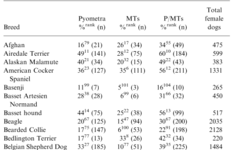Disclaimer: I had seen alot of threads on the topic of spaying/neutering dogs, so I know alot of people on here might be tired to hear or read it. Also, it isnt because I have a dog, but more as to be better prepared when I choose to get one. Also, Im a dane, so I know my english isnt the best and there most likely will be grammatic errors. As long you understand what Im writting, then Im glad.
This might be more on the topic for female dogs, but I also think that it can be used as examples too for male dogs. Anyhow back on track.
This question or renewed topic in my mind, just poofed into matter after I watched a video (I will keep the video private as not to paint a target on the uploader) In the video, the person said that the dog, a female husky and which the person had in for an appointment, had an emergency spay because the husky ended up developing pyometra. That is fair as to save the life of the dog, but the person also began to talk more on the topic that it is important that we spay/neuter our dogs.
My question just comes in as, how best do I decide if I want to spay or neuter my dog when I get one?
Im in for the more of being natural, aka, not spay/neuter our dogs as to keep them close to what nature wanted. Unless it is life threating where spaying/neutering is the only option to save the life of the dog in question. Plus I also do want to give the dog the longest possible life and moment of his/hers life. Reading through all the researches that had been done about the ups and downs for desexing a dog (Using that word, much easier) But not only for dogs, for any animales. In what I can make of it, then it is more or less a 50/50 chance of what either sides would end up with as well to give the dog the longest possible life. To me both desexing or not sounds bad, of what health problems that might come in the future. Is the world really on the meta of "Desexing your animals!" train right now? Because that is what I mostly hear and reads right now. The overwhelming side of those that say you should desex your dog, cat, rabbit, horse and so on. For me it sounds like the same if someone higher up chooses that us humans should be desexed too against our choice and will. And Im sure almost everyone, if not all of us, dont want that. It feels like the same here for our companions.
And it isnt like Im not familiar with having pets nor having pets that are desexed or not. Currently I have two female cats, both sisters, that are spayed. That was more of the choice of my mom, as it was planned to let them be outdoor cats. You know, so they dont risk to get kittens. That is fair, as well the cat we had before wasnt spayed and ended up getting a tumor where we had to get the vet to put her down.
I dont know if it is just me, but it is scaring to see how most of the world want us to be. As well, Im interested in what your experiences is with it, or what your standings are with "Desex animals" train. Im not against desexing animals, as I know that it can be life saving. But I do prefer that our companions arent being desexed, as to let them have their naturally way of life. I also know like 99.9% of us that have pets do like to give them the life they deserve as well to care for them the best that we can.
And also to the admins, Im sorry if this thread is in the wrong place. I just thought it might fit better here. If possible, then you are allowed to move it.
This might be more on the topic for female dogs, but I also think that it can be used as examples too for male dogs. Anyhow back on track.
This question or renewed topic in my mind, just poofed into matter after I watched a video (I will keep the video private as not to paint a target on the uploader) In the video, the person said that the dog, a female husky and which the person had in for an appointment, had an emergency spay because the husky ended up developing pyometra. That is fair as to save the life of the dog, but the person also began to talk more on the topic that it is important that we spay/neuter our dogs.
My question just comes in as, how best do I decide if I want to spay or neuter my dog when I get one?
Im in for the more of being natural, aka, not spay/neuter our dogs as to keep them close to what nature wanted. Unless it is life threating where spaying/neutering is the only option to save the life of the dog in question. Plus I also do want to give the dog the longest possible life and moment of his/hers life. Reading through all the researches that had been done about the ups and downs for desexing a dog (Using that word, much easier) But not only for dogs, for any animales. In what I can make of it, then it is more or less a 50/50 chance of what either sides would end up with as well to give the dog the longest possible life. To me both desexing or not sounds bad, of what health problems that might come in the future. Is the world really on the meta of "Desexing your animals!" train right now? Because that is what I mostly hear and reads right now. The overwhelming side of those that say you should desex your dog, cat, rabbit, horse and so on. For me it sounds like the same if someone higher up chooses that us humans should be desexed too against our choice and will. And Im sure almost everyone, if not all of us, dont want that. It feels like the same here for our companions.
And it isnt like Im not familiar with having pets nor having pets that are desexed or not. Currently I have two female cats, both sisters, that are spayed. That was more of the choice of my mom, as it was planned to let them be outdoor cats. You know, so they dont risk to get kittens. That is fair, as well the cat we had before wasnt spayed and ended up getting a tumor where we had to get the vet to put her down.
I dont know if it is just me, but it is scaring to see how most of the world want us to be. As well, Im interested in what your experiences is with it, or what your standings are with "Desex animals" train. Im not against desexing animals, as I know that it can be life saving. But I do prefer that our companions arent being desexed, as to let them have their naturally way of life. I also know like 99.9% of us that have pets do like to give them the life they deserve as well to care for them the best that we can.
And also to the admins, Im sorry if this thread is in the wrong place. I just thought it might fit better here. If possible, then you are allowed to move it.



